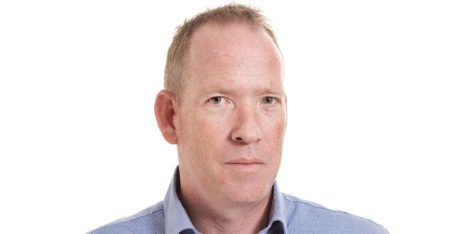
In a surprise development last month, Dimension Data announced that Werner Kapp was stepping down after only 14 months in the role and being replaced with a company veteran, Alan Turnley-Jones.
Now, in his first media interview since taking the reins from Kapp on 1 June, Turnley-Jones has set out his vision for the storied South African IT services group as it becomes increasingly integrated with parent NTT Inc, a unit of Japan’s Nippon Telegraph & Telephone. (NTT bought Dimension Data in 2010 for R24.4-billion and delisted it from the Johannesburg and London stock exchanges.)
The appointment of Turnley-Jones comes at a difficult time for Dimension Data, which last year became embroiled in a serious fraud scandal in which several former (still unnamed) executives at the company were implicated in a forensic probe into the December 2019 sale of The Campus, its sprawling head office in Bryanston, Johannesburg.
This emerged after NTT Ltd appointed the international law firm Herbert Smith Freehills to conduct a forensic investigation into allegations brought forward by a whistle-blower, TechCentral reported in January.
Dimension Data isn’t commenting on the status of that investigation, and a pre-condition of this interview — which TechCentral agreed to — was that the subject was off the table for discussion.
Following a decision last year by NTT to “double down” on its investment in the Africa and Middle East markets that Dimension Data serves, and the subsequent exit of top executives, including co-founder Jeremy Ord as well as Bruce “Doc” Watson, Saki Missaikos, John van der Vyfer and Steve Nathan, the make-up of the top management team has changed substantially.
Their exit, hot on the heels of NTT’s decision to “double down” on its investment, comes after intense speculation – never formally confirmed – that the management under Ord had been attempting to stage some sort of management buyout from NTT, and possibly even re-float the company on the JSE.
The interview
TechCentral editor Duncan McLeod sat down virtually over a Microsoft Teams call with Turnley-Jones to discuss how Dimension Data and NTT have started working much more closely together since last year; how the competitive landscape is changing; and what his strategic objectives are for the group. What follows is a shortened and edited transcript of that discussion.
Duncan McLeod: Tell me a bit about yourself, Alan. You’ve been with Dimension Data for a long time.
Alan Turnley-Jones: Twenty-three years. I spent the early part of my career, before Dimension Data, in what is now BCX, on the Q side of the PQ merger in those days.
My whole history has been in the services side of the industry, at BCX and at Dimension Data. I spent my first nine years in Dimension Data in the Cape Town business looking after the services business. I was also fortunate to spend time setting up the operations in Namibia and Angola.
The heritage that NTT acquired in Dimension Data specifically focused on managed services. We had been running that in South Africa for many years, and there was a view that this was the area the organisation really wanted to double-down on and grow.
So, I was asked to lead a programme of activities around that, initially for six months. Six years later, I decided it was time to stop looking at the inside of aeroplanes and airport lounges.
I came back into the Middle East/Africa business to run the services business. Then, in the bringing together of [software developer] Britehouse, Internet Solutions and the Systems Integration business, I looked after services across what we then termed One Dimension Data.
That was until recently (May 2021), when [NTT Inc CEO] Abhijit Dubey put out the NTT announcement about doubling down on the Dimension Data business in the Middle East and Africa. We pivoted to be aligned to the NTT Ltd structure. I picked up a portfolio called Managed Cloud and Infrastructure Services, which included the application assets that we had inherited through the Britehouse integration.
Then, a month ago, I stepped into this role.
So, yes, I have very much a services background – I’m a services bloke through and through.
 McLeod: You mentioned NTT doubling down in the region. I believe that came off the back of a lot of introspection about what NTT wanted to do with the Dimension Data assets. Can you provide some colour around what led up to that statement and what some of the discussions were?
McLeod: You mentioned NTT doubling down in the region. I believe that came off the back of a lot of introspection about what NTT wanted to do with the Dimension Data assets. Can you provide some colour around what led up to that statement and what some of the discussions were?
Turnley-Jones: I wasn’t intimately involved in that. What led up to the “doubling down” was in the context of Abhijit coming on board as the new global CEO [replacing Jason Goodall] and looking at the assets which existed around the organisation. At that stage, Dimension Data hadn’t been integrated fully into the NTT Ltd organisation – as all the other regions around the world had been in November 2019.
It has led to a lot of a focus on Africa and the Middle East, our relevance to the NTT Group in terms of what we take to market, the markets that we play in, and equally — and more recently — the capabilities that actually exist in Dimension Data, including the assets of Britehouse and Internet Solutions, and how those can be leveraged more broadly within NTT.
McLeod: It’s been a year since the NTT “doubling down” announcement. Take me through how Dimension Data has changed since then. What has it meant in terms of reporting structures and culture? Dimension Data has operated separately with its own brand, and that’s changing now?
Turnley-Jones: Your observation is spot on. We’re very proud as an organisation about what we’ve created in Africa and how that blossomed and expanded globally. What we saw play out last year with the “doubling down” is the closer alignment with NTT and alignment with the offers that we can draw down from NTT. Some of the new offers that we’ve “lit up” recently, things like private 5G, came down through NTT.
Prior to that, we were doing a lot of things ourselves: the capabilities we were taking to market were really born and bred in Dimension Data. That’s not stopping, and in fact a number of the things that we’ve built and developed locally are being elevated to become global offers. But what we’ve seen change since last year is we’ve gained access to things that we didn’t have in our in our basket before that we can take to market, and vice versa: NTT has gained access to things that will allow them to go faster in certain respects.
There was probably also a bit of duplication in the portfolio, with similar market offerings. We’ve taken the best of the best, deduplicated offerings and made sure we’re taking the right offers to market.
What’s also changed in the last year is NTT was running many services out of places like India, Barcelona and Prague. South Africa has been chosen as a global delivery hub for NTT. This is quite exciting for us.
McLeod: What has been the impact on the culture of Dimension Data? I’m thinking of what happened at Vodacom Group when Vodafone Group bought majority control. The culture of the organisation very definitely changed – it became more conservative and process driven. Is the same thing going to happen at Dimension Data?
Turnley-Jones: Very little has changed. Will it change? I don’t think that we will ever be a strongly process-driven type of organisation. One of the things that has made us great, and I think has made NTT great, is the fact that a lot of innovation happens at the edge. But we also probably do need to do a better job at productising it and making it repeatable. That’s certainly a focus I want to bring to it. We have to bring some repeatability and scaling into what we do. But we’re never going to be that end-to-end, absolutely rigid process organisation that you might see elsewhere. For example, as we engage in a cloud opportunity, it’s going to be different between financial services company 1 and financial services company 2. We have to have that 80/20 flexibility in what we do.
 McLeod: You’re investing, with NTT, in a big data centre in Midrand. How important is that for Dimension Data?
McLeod: You’re investing, with NTT, in a big data centre in Midrand. How important is that for Dimension Data?
Turnley-Jones: It’s a very important build and it’s the start of our investments in the data centre space both in South Africa and in the rest of Africa. It’s very important to us in terms of the value proposition, and not just at a Dimension Data level. It sits in the Global Data Centers business unit in NTT. Our relevance to local and global clients, particularly some of the larger players, necessitate that we have a footprint that can support them around the world.
Also, conversations with local clients show they want to shift from some of their legacy environments, which they have been maintaining themselves, into a data centre such as Johannesburg 1. It’s critical to our core value proposition – without it, we would battle. And it’s the start of a journey and further investments will be made.
McLeod: Internet Solutions has historically operated data centres, like the one in Randview in Randburg, Johannesburg. What happens to these?
Turnley-Jones: Those data centres are going to continue operating. But all future investments will go into the Global Data Center play. In time, we will decide what’s the strategy for retaining those or shifting the services into the Global Data Center business.
McLeod: Is your mix of competitors changing? Historically Dimension Data competed in South Africa against BCX, EOH and other IT services companies. Are you finding those are still your competitors, or are you finding yourself competing more with the likes of Amazon Web Services and Microsoft, both of which have deployed data centres locally?
Turnley-Jones: It’s a bit of both, to be honest. We still absolutely compete with the BCXes and EOHes of the world, and I think that typically comes in when we’re doing broader “solutioning” and broader managed services. But your observation is correct in that clients are starting to direct spending into the likes of a Microsoft or an AWS. What’s happening, though, is they’re not putting all their eggs in one basket, and so integrators are still required. Corporate South Africa is going to have a multi-cloud strategy, so there is going to be a role for us to play – more and more. The complexities around mainframe and application modernisation are rearing their head. The realisation is this is a journey that will take a number of years.
McLeod: Let’s talk about the One Dimension Data strategy, which was crafted under the leadership of Werner Kapp’s predecessor, Grant Bodley. Are you comfortable with that strategy?
Turnley-Jones: I was part of the One Dimension Data strategy formulation with Grant and Werner at the time. I am fully supportive of it, as are our clients.
McLeod: Do you plan to hang onto Mweb? Why hang onto a consumer Internet service provider?
Turnley-Jones: We’ve been looking at our overall portfolio, and retaining Mweb is the current strategy. As I get into the role and have an opportunity to look at the entire portfolio, we’ll make some calls.
McLeod: What will you do differently to your immediate predecessor?
Turnley-Jones: From a from a culture perspective, and it’s not to say Werner wasn’t doing this, but what I want to double down on is getting the growth and that winning culture within Dimension Data and growing in the market.
From a portfolio perspective, what got us here is not going to get us forward, so there’s also going to be quite a shift from me in some of the new areas, and some of the new offers and capabilities that we can draw down from NTT. We’re doing a lot of work now around private 5G, and there’s some quite exciting engagements we have with clients on that, on some of the work we’re doing around edge computing, bringing operational technology into the mix.
McLeod: What do you for fun? Are you a crazy cyclist, like so many of your predecessors?
Turnley-Jones: I’m a mountain biker. I’m fortunate living in Cape Town. I’m at the Tour de France [this] week. (NTT is technology partner.)
McLeod: What other hobbies do you have?
Turnley-Jones: I’m an outdoors person. I love the outdoors. I’m married with three boys, so they keep me tremendously busy. Being in IT, I love seeking out places in the outdoors with no connectivity. You’ll find me on holidays off-grid. I love camping and just getting away from things.
McLeod: Will you stay in Cape Town?
Turnley-Jones: I’m going to be commuting. The head office is Jo’burg, but with Covid and hybrid working, I think it’s possible.
McLeod: Will Dimension Data become more of a Cape Town company on your watch?
Turnley-Jones: No, it will retain its city-based feel, relevant to its clients in the cities in which they operate. — (c) 2022 NewsCentral Media




